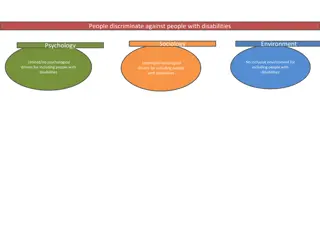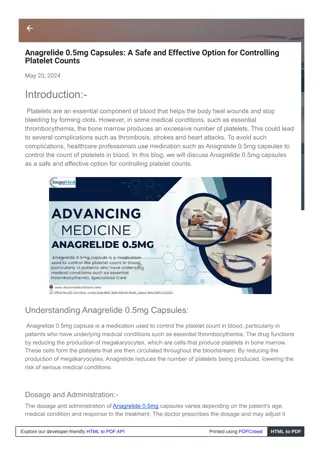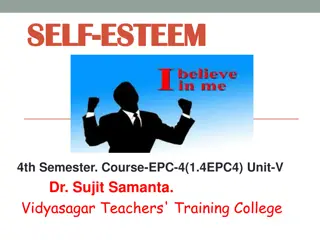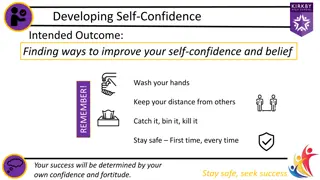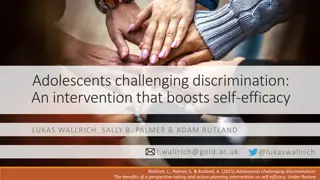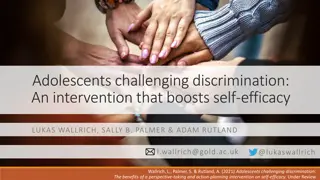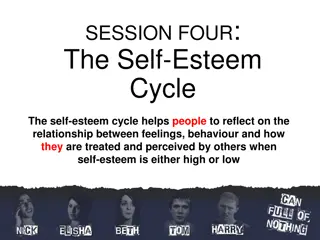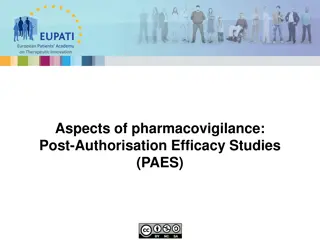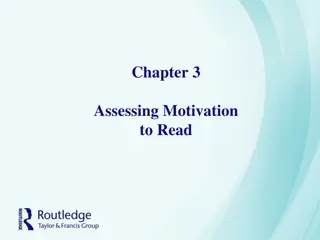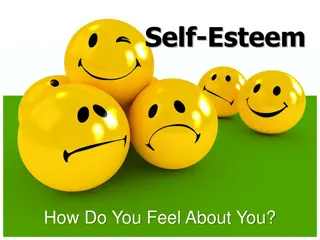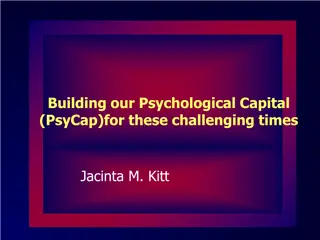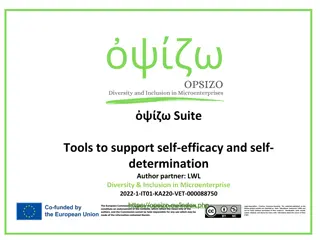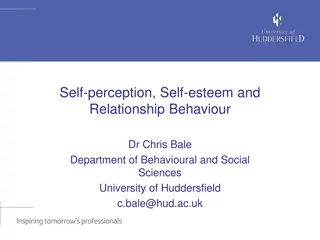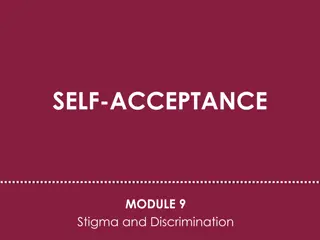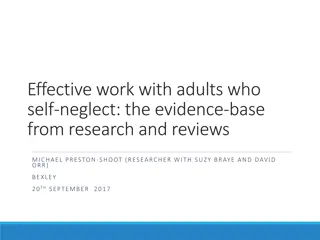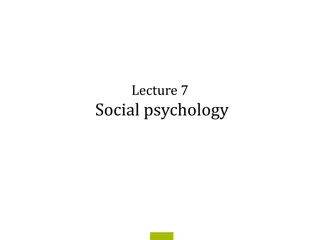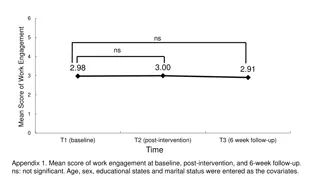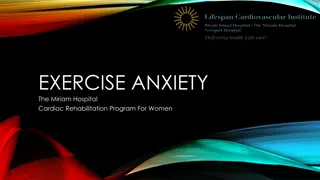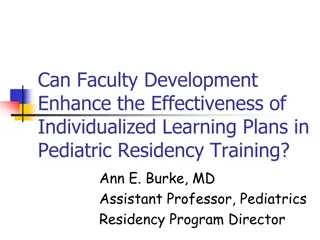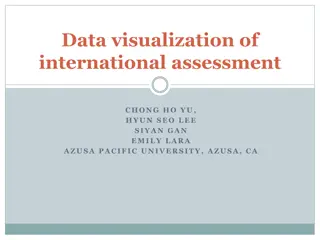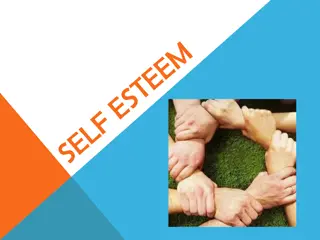Digital Citizenship: Self-Image, Social Media, and Self-Esteem
Explore the impact of social media on self-image and self-esteem. Learn about the influence of filters and media on body perception. Reflect on self-assessment and take-home activities to improve self-confidence.
3 views • 11 slides
Student Perceptions of Writing Self-Efficacy and Future Goals
Explore student perceptions on writing self-efficacy and future writing goals. Survey data from WR courses reveals areas of improvement such as time management, argument building, and grammar skills.
2 views • 7 slides
Protection Motivation
Protection Motivation Theory (PMT) explores how individuals respond to health threats, either adaptively or maladaptively. By assessing threats and coping mechanisms, people may engage in behaviors to protect themselves. PMT emphasizes the appraisal of threat severity, likelihood, response efficacy,
4 views • 9 slides
Exploring Teacher Professional Development and Maths Anxiety
This collection of images and descriptions explores the reduction of Teacher MA, the Knowledge Quartet framework, the impact of teacher MA on pupil outcomes, the importance of addressing maths anxiety in both male and female students, and various measures and interventions for professional developme
0 views • 25 slides
Understanding Self-Worth in Children: Building a Strong Foundation
Explore the importance of self-concept, self-esteem, and self-worth in children's development. Learn how parents can positively impact a child's self-perception and self-value through nurturing experiences. Discover the key sources influencing children's self-worth and the critical role of early lif
0 views • 30 slides
Understanding Drivers for Inclusion of People with Disabilities
The content explores various drivers influencing the inclusion of individuals with disabilities, spanning across sociology, psychology, and environmental factors. It delves into the significance of national policies, funding, institutional procedures, self-efficacy, accessibility, and more in foster
0 views • 5 slides
Anagrelide 0.5mg: An Effective Treatment for Essential Thrombocythemia
Efficacy and Dosage Efficacy & Dosage Efficacy of Anagrelide (0.5mg) What is Anagrelide? Essential thrombocythaemia is a condition in which an excessive amount of platelets are present in the blood. Anagrelide 0.5 mg inhibits the production of platelets, thereby reducing the risk of blood clotting,
0 views • 3 slides
Understanding Self-Esteem: Meaning, Importance, and Types
Self-esteem is how we perceive our worth and value. High self-esteem leads to confidence and positivity, while low self-esteem can result in self-doubt and negative emotions. Self-esteem impacts mental health, behavior, decisions, relationships, and overall success in life. Recognizing and nurturing
2 views • 15 slides
Understanding Self-Esteem and Ways to Improve It
Self-esteem is our perception of ourselves, impacting how we navigate life. Healthy self-esteem fosters positivity, while low self-esteem can be detrimental. Various factors, like childhood experiences, contribute to low self-esteem, but steps can be taken to improve it. Building positive relationsh
0 views • 14 slides
Understanding the Self: Psychology's Focus and Implications
The field of psychology has long been intrigued by the concept of self, exploring its importance to well-being, self-esteem, and brain localization. Research reveals how excessive optimism, self-bias, and blindness to incompetence can impact self-esteem. Contrasting individualist and collectivist cu
1 views • 41 slides
Building Self-Confidence: Key Steps and Benefits
Understanding self-confidence, its importance, and how to develop it can lead to enhanced resilience, motivation, reduced fear and anxiety, and a stronger sense of self. Self-confidence allows for confident behavior, while lack of it can lead to self-doubt and avoidance of risks. Learning to embrace
0 views • 7 slides
The Importance of Self-Awareness in Personal Growth
Self-awareness is crucial for understanding one's character, feelings, and motivations. It helps in recognizing strengths and weaknesses, managing stress, improving communication, and fostering empathy. Developing self-awareness involves introspection, mindfulness, self-reflection, and seeking feedb
2 views • 47 slides
Developing a Self-Care Action Plan for Overall Well-Being
Self-care involves deliberate activities to nurture mental, emotional, physical, and spiritual health, yet it is often neglected. This guide explores the essence of self-care, emphasizes the importance of building a personalized self-care action plan, and provides insights into taking care of your b
0 views • 19 slides
Intervention Boosting Self-Efficacy Among Adolescents Challenging Discrimination
Adolescents challenging discrimination through a perspective-taking and action-planning intervention showed increased self-efficacy, particularly among White participants. The intervention, which included facilitated discussion sessions, led to positive outcomes and highlighted the importance of bys
0 views • 7 slides
Boosting Self-Efficacy in Adolescents: Intervention Study
Adolescents challenged discrimination through a perspective-taking and action-planning intervention, leading to increased self-efficacy, especially among White participants. The intervention involved facilitated discussions, self-disclosure, and sharing experiences to empower adolescents to interven
0 views • 7 slides
Enhancing Self-Confidence for Professional Success
Understanding the importance of self-confidence in the workplace is crucial for personal growth and career advancement. Self-confident individuals trust their abilities, maintain a sense of control over their lives, and have realistic expectations. This summary delves into the characteristics of sel
0 views • 13 slides
Understanding the Self-Esteem Cycle: High vs Low Self-Esteem
The self-esteem cycle explores the interplay between one's feelings, behavior, and how they are treated based on their self-esteem level. High self-esteem is associated with positive feelings, supportive behavior, and positive interactions, while low self-esteem manifests in negative emotions, withd
9 views • 4 slides
Understanding Pharmacodynamics: Potency and Efficacy
Pharmacodynamics explores how drugs interact with receptors in the body, affecting the magnitude of drug effects based on concentration. Graded dose-response relationships, potency, and efficacy play key roles in determining drug efficiency. Potency reflects the amount of drug needed for a specific
0 views • 21 slides
European Patients Academy on Therapeutic Innovation: Post-Authorisation Efficacy Studies (PAES)
The European Patients Academy on Therapeutic Innovation focuses on PAES to address important questions about medicine efficacy post-authorization. Regulators may request such studies to resolve concerns and ensure the initial evidence for marketing authorization is upheld. PAES can be triggered by N
5 views • 6 slides
Understanding Motivation in Reading Development
Explore the vital role of motivation in reading skills acquisition and comprehension. Discover how motivation impacts engagement, self-efficacy, and learning to read. Learn about instructional practices to enhance reading motivation and self-efficacy, ultimately fostering a love for reading and impr
0 views • 38 slides
Enhancing Self-Regulation for Formative Assessment through Social and Emotional Learning
Explore the significance of self-regulation in formative assessment, understand key concepts like self-control, emotional competence, and perseverance. Discover actionable strategies to implement self-regulation interventions with students and train other adults effectively. Future orientation and s
0 views • 25 slides
Understanding Mindful Self-Judgment and Its Role in Mental Health
Mindful self-judgment is a complex concept that involves balancing self-awareness and self-compassion. While nonjudgment is a key aspect of mindfulness practices, there is a debate on whether mindful self-judgment can be appropriate and functional in certain circumstances. Researchers like June Pric
2 views • 46 slides
Understanding Self-Esteem: Highs and Lows
Self-esteem is the judgment we hold about ourselves, shaped by experiences and relationships. High self-esteem individuals embrace new encounters with confidence and positivity, while low self-esteem individuals struggle with self-doubt and criticism. Recognizing signs of low self-esteem is crucial
0 views • 11 slides
Enhancing Self-Regulation Skills in Children: Strategies and Tips
Understanding and fostering self-regulation in children is crucial for their development. Self-regulation involves controlling impulses, focusing, and shifting between tasks. This article delves into the internal mechanisms of self-regulation, such as executive function, and provides practical tips
1 views • 22 slides
Building Your Psychological Capital (PsyCap) for Challenging Times
Building Psychological Capital (PsyCap) involves enhancing Hope, Optimism, Self-Efficacy, and Resilience. Hope energizes in trying circumstances. Optimism focuses on positive future expectations. Self-Efficacy requires realistic self-belief. Resilience is about bouncing back after adversity through
0 views • 9 slides
Boosting Your Child's Self-Esteem & Confidence in Parenting Workshop Series
Understanding self-esteem in children is crucial for their emotional development. Healthy self-esteem leads to positive behaviors, while low self-esteem can result in negative self-perceptions. Recognizing signs of healthy and unhealthy self-esteem allows parents to support and nurture their child's
0 views • 11 slides
Enhancing Self-Efficacy and Self-Determination in the Workplace
Establishing high levels of self-efficacy and self-determination in the workplace is crucial for accomplishing tasks and goals effectively. This publication explores the significance of these traits, providing strategies for managers to foster and maintain them. Discover why self-efficacy and self-d
0 views • 8 slides
Understanding Self-Perception, Self-Esteem, and Relationship Behavior
The discussion explores the impact of low self-esteem on various psychological issues, societal views on self-worth, self-perception biases, and the consequences of self-esteem in different aspects of life, backed by research and theories such as the Better-Than-Average Effect and Sociometer Theory.
0 views • 19 slides
Early Forecasting of Undergraduate Majors: Efficacy and Bias
Investigation of early forecasting of undergraduate majors using natural language approach, highlighting efficacy and potential biases. The study involves data from a private research institution over a decade, various data representation models, and bias testing analyses based on gender and GPA. Re
0 views • 11 slides
Understanding Self-Acceptance and Overcoming Stigma
Self-esteem and self-acceptance are distinct concepts, with self-acceptance focusing on embracing all facets of oneself unconditionally. Developing self-acceptance involves stages like aversion, curiosity, tolerance, and allowing. Overcoming avoidance and resistance can lead to self-compassion and g
0 views • 10 slides
Understanding Leadership and Self-Leadership for Personal Development
Leadership is defined as an influence relationship between leaders and followers striving for real change. It involves self-awareness, self-management, and self-development. Self-leadership begins with understanding oneself, motives, and capabilities through self-awareness, ultimately leading to pur
0 views • 42 slides
Understanding Self-Neglect in Adults: Challenges and Research Insights
This content delves into the complex issue of self-neglect in adults, covering its definition, key challenges, and the research evidence available. It explores the various aspects of self-neglect, including neglect of self-care, domestic environment, and refusal of services. The challenges associate
0 views • 39 slides
Understanding the Self in Social Psychology
Delve into the concept of the individual and the self in social psychology, exploring how identities have evolved historically and the distinction between collective and individual selves. Learn about self-awareness, Wundt's differentiation of I and me, and Higgins' self-discrepancy theory, shedding
0 views • 84 slides
Workplace Intervention Study Results
The study presented results on work engagement, gratitude, self-efficacy, psychological distress, and job performance at baseline, post-intervention, and 6-week follow-up. Significant improvements were observed in gratitude and self-efficacy scores, while work engagement and job performance remained
0 views • 5 slides
Monitoring Chemoprevention Efficacy: Draft CPES Protocol
Contextual guidelines are being reviewed for expanding chemoprevention interventions, highlighting concerns over resistance and efficacy. Therapeutic Efficacy Studies (TES) play a crucial role in monitoring treatment outcomes, but molecular markers of resistance are imperfect predictors of chemoprev
0 views • 8 slides
Understanding Anxiety and Self-Efficacy in Cardiac Rehabilitation Programs
Explore the relationship between anxiety, self-efficacy, and exercise adherence in women participating in cardiac rehabilitation programs. Discover how addressing anxious thoughts and building exercise confidence can improve overall cardiac health outcomes.
0 views • 13 slides
Enhancing Individualized Learning Plans in Pediatric Residency Training
The study focuses on whether faculty development intervention can enhance the effectiveness of Individualized Learning Plans (ILPs) in pediatric residency training. It aims to improve faculty and trainee experiences with ILPs, including increasing faculty perception of ILP importance, self-directed
0 views • 16 slides
Safety and Efficacy of BNT162b2 mRNA Covid-19 Vaccine Phase 3 Data
Phase 3 data of the BNT162b2 mRNA Covid-19 vaccine, including study design, participant groups, primary endpoints, and key findings regarding safety and efficacy. The vaccine demonstrated efficacy against confirmed Covid-19, with reported local and systemic adverse effects within a specified timefra
0 views • 48 slides
Correlation Between Self-Efficacy and Test Performance Based on International Assessment Data
Explore the correlation between self-efficacy, readiness to learn, intrinsic and extrinsic motivation with test performance using data from international assessments like PISA and PIAAC. Learn about the limitations of linear models in psychological research and the debate around self-efficacy accord
0 views • 32 slides
Boosting Self-Esteem: Benefits and Tips for Improvement
Understanding self-esteem, its benefits, and risks of low self-esteem are essential for personal growth. Developing high self-esteem can lead to increased self-respect, goal achievement, and willingness to try new things. On the other hand, low self-esteem can make individuals vulnerable to peer pre
0 views • 10 slides





